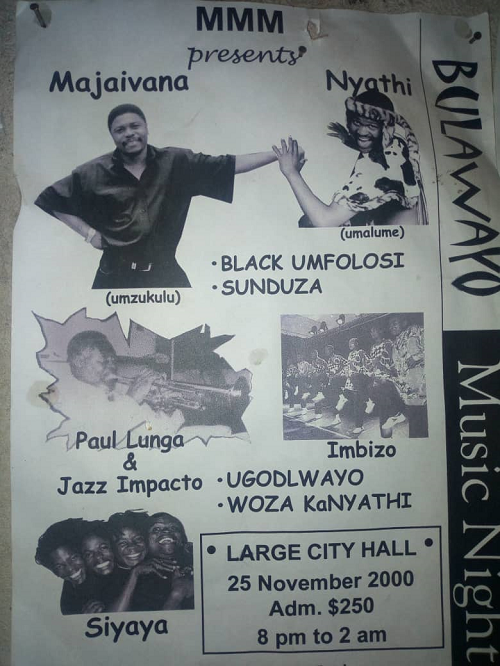
The Sunday News

Mthabisi Tshuma, Sunday Life Correspondent
THE lack of support given to artistes countywide by people who argue to be fully behind these stars is something that for a while has been an unending debate.
Notable among these people who have condemned such is United States of America-based legendary mbaqanga musician Lovemore Majaivana.
In an interview recently with YouTube channel Zazise Wide, Majaivana said the plight of artistes will remain the same-poor.
He alluded that in his heydays as a performer that at times the unbalanced success patterns of musicians was in existence and for such reasons, he deserted his fans and stopped making music for good as he was underpaid for his art.
“Whenever I went to get my cheque after performance, I saw that I was underpaid,” said Majaivana.

A poster of November 25 2000 which was Lovemore Majaivana’s last show
Sunday Life caught up with veteran musician Jeys Marabini who in his career later went on to be a music promoter. Through dedicating music as a profession Jeys Marabini managed to tour overseas to places like India, Singapore, United Kingdom, United States of America, Germany and Ireland.
There he learnt to be a music promoter and this has seen him promote adept artistes that include Albert Nyathi, Imbizo, The Lions, Siyaya, John Chibadura, South Africa’s Jazz outfit Tanana and Tanzania’s Bukoza Wese.
Marabini recalls how the last gig for Majaivana to grace in the city on November 25 in 2000 had a star studded lineup that should have had a full house audience but failed to.
“Myself working with Albert Nyathi were the ones who organised Majaivana’s last show where we called on various groups to headline the event that was held at Large City in Bulawayo. The groups were so many and included Black Umfolosi, Godlwayo Omnyama, Imbizo, Paul Lunga, Siyaya and many more. I remember paying him for the show where he came to collect the money at my place of residence at that time in Lobengula,” said Marabini.

Jeys Marabini holds a poster of November 25 2000 which was Lovemore Majaivana’s last show
The Marabini single hit maker said the show was great although the attendance was worrying and is the one which ultimately destroyed Majaivana’s love for music which has seen him become a man of the cloth.
“The show was great, massive and we really enjoyed every bit of it although the event was not full. This is what Majaivana always cried foul about and l remember two months back before that show, there was one gig where he was performing with Oliver Mtukudzi which was full and after that people started not to come.
Majaivana used to tell me a lot of things about the lack of support and that people should learn to support each other,” he said.
Before taking up the role of a music promoter, Marabini had his own life as an artiste who would put it all on the stage.
Growing up in rural Filabusi in Dekezi village, Jeys Marabini’s musical background can be traced from secondary school, but it was not until 1991 at the age of 20 that he decided to become a professional musician where he took music as a job and formed a band called Comforting Brothers, which later changed its name to Imbizo.
By the time he was in the Comforting Brothers, the artiste was known as Majaha and by the time he got into the Imbizo outfit this was the time that he assumed the name “Jeys Marabini”, presumably from his debut album Emarabini in 2002 which was entailing the flamboyant dressing that one would see in the 60s and 70s (emarabini).
“I started singing in the late 80s. To me music is in my blood. When I first started out I formed a group in my village called Amasango Asemakhaya. This group was inspired by Black Mambazo and the records we would listen back in the day mostly of Imbube genre.
“When I finished my “O” level, that is when I took music as a profession and from the onset I took music as a job, something that will drive me to be a successful musician. Even today my children know that when I am going out, I am going to work, not to just a show,” said Jeys Marabini.
When performing in the city, Jeys Marabibni remembers how they would be splashed money as they performed at beer gardens that include Madlodlo beer garden in Makokoba, Gibixhegu in Entumbane, Siqongweni in Lobengula West and Marisha in Old Magwegwe.
“Audiences back then were amazing and from the bottom of my heart that was the time I enjoyed music. People were united as they attended in numbers but now due to the fact that music is dead, quality very bad as artistes are no longer going all out in their productions, a few people attend their shows,” narrates Jeys Marabini.
Jeys Marabini feels young artistes that are slowly coming up should be held in their hands as they cross the road to success and to fulfill this he has for some time been offering up and coming artistes free record sessions at his house studio which he hopes will open doors for many young artistes in the city.
The adept legendary musician has managed to release album after album like Emarabini (2002), Thuthuka Ngothando (2003), Sound of Today and Tomorrow (2004), Jeys Marabini One Time (2006), Izenzo (2009), Jeys @40 (2011), Isilo (2013), Thula Sana (2016) and Ntunja mbila (2018).
@mthabisi_mthire



